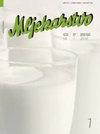放牧系统和室内系统对羊奶、盐水奶酪和乳清品质的影响
IF 1.1
4区 农林科学
Q3 AGRICULTURE, DAIRY & ANIMAL SCIENCE
引用次数: 1
摘要
本研究旨在调查饮食和不同的山羊生产系统是否会影响牛奶、白腌奶酪和乳清的质量。它还旨在确定羊奶是否适合生产白腌奶酪。研究了生羊奶的理化成分、卫生质量、乳和白卤干酪的脂肪酸组成和营养指标。传统的白腌奶酪是由两个农场的散装羊奶制成的,共有三个样品。结果证实,不同的饲养制度和日粮会影响羊奶和奶酪的理化组成及其脂肪酸组成。放牧山羊的牛奶和奶酪含有显著更多的脂肪、蛋白质、总固体和更高的奶酪产量百分比(p<0.05)。营养指数也更有利,致动脉粥样硬化(AI)和血栓形成(TI)指数较低,健康促进指数(HHP)和低胆固醇/高胆固醇比率(HH)较高。山羊放牧导致牛奶和奶酪中n-3脂肪酸含量较高,从而导致n-6/n-3比例较低。牧场奶的干酪制作效率和凝乳中的蛋白质回收率(%REC)更好,而山羊奶的脂肪回收率更好。消费者对这两种生产系统中未成熟的白奶酪的评价最高。此外,用盐水生产白奶酪可以生产出具有显著健康益处的优质乳清。天然牧场给山羊带来的好处远大于禁闭,尤其是在使用的早期阶段。这有助于羊奶、奶酪和乳清的高营养价值。本文章由计算机程序翻译,如有差异,请以英文原文为准。
The influence of grazing and indoor systems on goat milk, brined cheese and whey quality
This study aimed to investigate whether diet and different goat production systems affect the quality of milk, white-brined cheese and whey. It also aimed to determine the suitability of goat's milk for the production of white-brined cheese. The physicochemical composition and hygienic quality of raw goat's milk were studied, as well as the fatty acid profile and nutritional indices of milk and white-brined cheese. Traditional white-brined cheeses were produced from bulk goat milk from two farms in three samples. The results confirmed that different husbandry systems and diets influence the physicochemical composition of goat milk and cheese and their fatty acid profile. Milk and cheese from grazing goats contained significantly more (p<0.05) fat, protein, total solids and a higher percentage of cheese yield. Nutritional indices were also more favourable, with a lower atherogenic (AI) and thrombogenic (TI) index and a higher health-promoting index (HHP) and hypocholesterolemic/hypercholesterolemic ratio (HH). Goat grazing contributed to a higher content of n-3 fatty acids in milk and cheese and thus to a lower n-6/n-3 ratio. Cheese-making efficiency and protein recovery in the curd (%REC) was better with pasture milk, whereas fat recovery was better with milk from housed goats. Consumers rated the unripened white cheeses from both production systems the highest. In addition, the production of white cheese with brine results in good quality whey with significant health benefits. Natural pasture provides significantly more benefits to goats than confinement, especially in the early stages of use. This contributes to the high nutritional value of goat's milk, cheese and whey.
求助全文
通过发布文献求助,成功后即可免费获取论文全文。
去求助
来源期刊

Mljekarstvo
Agricultural and Biological Sciences-Animal Science and Zoology
CiteScore
1.90
自引率
41.70%
发文量
18
审稿时长
12 weeks
期刊介绍:
Mljekarstvo is an open access, peer-reviewed international quarterly scientific journal. The first issue was published in 1951, by the Croatian Dairy Operators'' Association (today: Croatian Dairy Union, publisher). In a paper at a Union conference held 28 October 1951 in Zagreb it was said: "Our desire is that this magazine does not meet the fate of its predecessors, but that it continues to reflect the creative efforts and to provide guidelines for the producers as well as all other operators employed in the dairy industry."
It is our pleasure today to say that wishes of the enthusiasts who attended the conference have come true, and the magazine Mljekarstvo during the last six decades was a reflection of the creative efforts of numerous dairy scientists and experts, and through its texts it served as a guideline in improving production and processing of milk and dairy products. Mljekarstvo has been following all the achievements of the dairy profession in Croatia, and it also gives the short surveys of world achievements. The result of the research of local and foreign scientists and experts always find their place in the magazine Mljekarstvo. It has been edited by our outstanding dairy experts employed at colleges, research institutions and dairy companies.
 求助内容:
求助内容: 应助结果提醒方式:
应助结果提醒方式:


